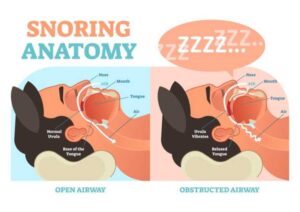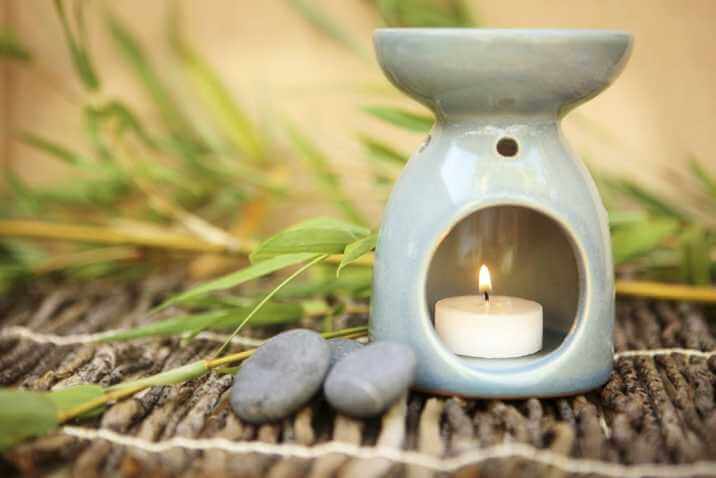Are you a snorer? Or are you living with a snorer? You’re not alone! Research indicates that 25% of adults are habitual snorers, whilst as many as 45% snore occasionally.
So what causes it? Snoring occurs when you progress from a light to deep sleep, and the muscles in the roof of your mouth, throat and tongue relax, which can inhibit the movement of air through the nose and throat, making the surrounding tissues vibrate to produce the sound of a “snore”. People with an excess of throat or nasal tissue, or who have less rigid tissue are more prone to snoring. Of course, blocked sinuses, allergies, cold or flu, excess weight or obesity, and alcohol consumption can also have an effect.
Whilst many people may joke about snoring, it can actually be detrimental to your health. A long-term snorer can affect their own sleep quality. Not to mention their partner’s – but we’ll get to that later! Snoring can also indicate a health problem such as obstructive sleep apnoea, which is a potentially dangerous sleep disorder. Obstructive sleep apnoea occurs when the soft tissues relax to such an extent that they completely block the airway and breathing is cut off. An indicator of this is if you often awake abruptly during the night, gasping for breath or choking. Lesser symptoms are awaking in the morning with a sore throat, dry mouth, headache or not feeling refreshed, or having difficulty concentrating, or suffering from drowsiness or irritability throughout the day. Excess weight, obesity and inflammation are high contributors to this disorder. Research shows that obstructive sleep apnoea sufferers are more likely to develop high blood pressure, and may have an increased risk of heart attack, stroke, and an abnormal heart rhythm, such as atrial fibrillation.

It’s not just your health that can be in jeopardy, snoring can also be a key contributor to the breakdown of a relationship. One study found that there was a higher divorce rate amongst couples living with snoring. A lack of quality sleep can leave both partners feeling irritable and tense. The non-snoring partner resents the snorer for disturbing their sleep, and the snorer feels unfairly treated, or frustrated by the poke in the ribs or their partner’s anger. One solution is to sleep in separate rooms which in turn puts a strain on physical and emotional intimacy, and leads to further resentment.
So what’s another solution? How about trying the natural effects of essential oils? Many people swear by these as a natural solution to snoring. So which is the best to stop or dramatically reduce that snoring? Here’s our top picks:
Peppermint
Peppermint oil has anti-inflammatory properties, and a purifying effect. It can help to clear the sinuses and airways and make it easier to breathe, and is a great support for flu or cold symptoms. Furthermore it can reduce muscular aches and pains, and reduce neck tension which may be contributing to a poor sleep position or causing sleep restlessness, all which can contribute to snoring.

Eucalyptus
Eucalyptus oil is well known as a herbal decongestant. It is an excellent support for respiratory problems, relieving the symptoms of asthma, bronchitis, colds, flu, asthma, inflammation of mucous membranes, sore throats and hay fever. It is known to break up the mucus in the sinuses, throat and respiratory system, clearing the airways and opening the nasal passages to improve breathing. It also has strong anti-inflammatory properties. It works wonders to promote better breathing all night long.
Lemon
Lemon Oil has strong anti-inflammatory, decongestant and antispasmodic properties. It can help to clear the sinuses and airways, and soothe the respiratory tract and a sore throat.  Lemon oil has the ability to stimulate skin contraction, and it is believed that this same effect could help to tone the tissues in the mouth and throat, which along with the antispasmodic property, helps to eliminate any vibration and subsequent snoring.
Lemon oil has the ability to stimulate skin contraction, and it is believed that this same effect could help to tone the tissues in the mouth and throat, which along with the antispasmodic property, helps to eliminate any vibration and subsequent snoring.
Fennel
Fennel Oil is used to reduce inflammation and improve airflow through the respiratory tract and nasal passageway. It also acts as a decongestant, helping to break up the mucus in the sinuses, throat and respiratory system to improve breathing.
Marjoram
Marjoram has antioxidant, expectorant, and anti-inflammatory properties. It has a long tradition of being used to clear the airways, and as an anti-snoring remedy. Marjoram oil helps to calm the respiratory system, reduce inflammation, and breakdown mucus which may be causing an obstruction. It relieves symptoms of respiratory congestion including asthma, bronchitis, common cold, flu and allergies. This oil’s stimulating effect helps to fully open the airways, making it particularly valuable for the relief of sleep apnoea.
There are several ways to use the oils for the relief of snoring:
- Add a few drops to a diffuser or oil burner and place in the bedroom;
- Add a few drops to a bath product and enjoy a hot bath;
- Add a few drops to a carrier oil and massage into the skin or soles of the feet;
- Add a few drops to a bowl of hot water and inhale the steam;
- Add a few drops to the bed sheets.
Additionally the snorer may be helpful to change their sleeping position to laying on their right side, which is known to reduce snoring and also encourage blood flow.
It is also advised not to eat a heavy meal less than five hours before retiring to bed as digestion has a relaxing effect on the throat muscles.
Certain food and drinks can also cause inflammation, increase mucus production or even relax the muscles. It is recommended to avoid wheat, sugar, chocolate, soy, fruit (especially potatoes, bananas, corn and cabbage), dairy products, red meat, pork, coffee, tea and alcohol at least two hours before bed. Sedatives also have the effect of loosening the throat muscles.
We wish you sweet dreams and a peaceful undisturbed night’s sleep.






